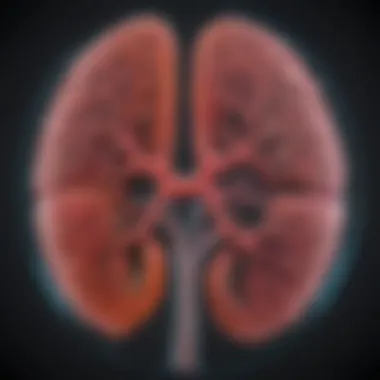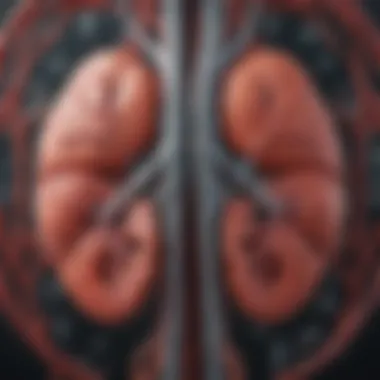Understanding Kidney Health's Impact on Mental Well-Being


Intro
The relationship between kidney health and mental well-being is becoming more recognized. Chronic kidney disease can affect not only physical health but also mental stability. Understanding this connection is essential for both patients and healthcare professionals. This article aims to unravel the complexity of how kidney function influences psychological health and vice versa.
Research Overview
Summary of key findings
Recent studies reveal a significant link between renal impairment and mental health disorders. Patients with chronic kidney disease often experience higher rates of depression and anxiety. For instance, one study showed that nearly 40% of individuals with kidney disease reported symptoms of depression. Additionally, there is growing evidence that the biochemical changes from kidney dysfunction can influence mood and cognitive function.
Importance of the research in its respective field
Understanding these findings is crucial. It suggests that managing kidney health should include psychological assessment and support. Combining treatments for kidney health and mental well-being could improve overall outcomes for patients. This integrated approach emphasizes the need for interdisciplinary care in treating individuals with renal problems.
Methodology
Description of the experimental or analytical methods used
Various methodologies have been employed to investigate the link between kidney health and mental well-being. Researchers utilize both quantitative and qualitative approaches. Surveys and standardized tests are common tools to assess mental health status in patients with kidney disease. In addition, blood tests help measure the physiological aspects of renal function, complimenting psychological assessments.
Sampling criteria and data collection techniques
Participants typically include adults diagnosed with chronic kidney disease at varying stages. Researchers gather data through interviews, questionnaires, and clinical evaluations. This multi-faceted approach allows for a comprehensive understanding of the complex relationship between kidney health and mental health outcomes.
"Integrating mental health into kidney disease management is not just beneficial; it is essential for holistic care."
This exploration emphasizes the vital link between kidney function and psychological well-being, advocating for better care models that consider both aspects.
Prolusion
In contemporary health discourse, the interplay between physical health, especially kidney function, and mental well-being has gained significant attention. It is now recognized that kidney health is not an isolated concern. Rather, it has deep implications on mental states and cognitive functions. This article aims to underscore the necessity of integrating these two facets of health by showcasing the intricate connections between them.
Chronic kidney disease can lead not only to physical discomfort but also to psychological distress. Individuals diagnosed with renal impairment often face an increased risk of developing mental health disorders such as depression and anxiety. Understanding this relationship accentuates the importance for healthcare professionals to adopt a more holistic treatment approach.
By addressing both kidney health and mental well-being in tandem, we stand to improve quality of life for patients. This introduction serves to frame the discourse surrounding the vital link between renal functions and mental health.
Overview of Kidney Function
The kidneys are essential organs in the body, primarily responsible for filtering waste and excess fluid from the blood. They regulate various bodily functions, including electrolyte balance, blood pressure, and pH levels. The complex systems within the kidneys do not only manage physical health. Their role extends to influencing emotional and mental well-being.
Kidneys operate through a filtering mechanism known as nephrons. These functional units remove toxins and maintain homeostasis. When kidney function is compromised, it leads to a build-up of waste products in the bloodstream, which has the potential to affect neurotransmitter levels and subsequently mood.
Mental Health: Definitions and Importance


Mental health encompasses emotional, psychological, and social well-being; it affects how individuals think, feel, and act. Mental health is integral to overall health, influencing how we handle stress, relate to others, and make choices. The significance of this well-being cannot be overstated, especially in an increasingly complex world. It requires not only attention but also proactive measures to maintain it.
The importance of mental health extends into all aspects of life - from personal relationships to work productivity to physical health outcomes. As such, understanding underlying contributors to mental well-being, like kidney health, becomes crucial. Ensuring both physical and mental health is essential in providing patients with comprehensive care.
The Physiology of Kidney Health
The physiology of kidney health is a crucial aspect of understanding the intricate connection between renal function and mental well-being. The kidneys perform several vital functions that extend beyond filtration and waste removal. Their role in maintaining homeostasis is fundamental for overall health, influencing numerous bodily systems, including those that relate to mental health. A deep dive into the physiology of the kidneys allows us to appreciate their importance in regulating electrolytes, hormones, and fluids, which in turn affects psychological conditions.
Role of Kidneys in Homeostasis
The kidneys act as regulators of the body's internal environment. They maintain homeostasis through several mechanisms. They filter blood, removing waste products and excess substances, while reabsorbing necessary nutrients. Here are some key functions:
- Fluid balance: The kidneys control the amount of water in the body. By adjusting urine concentration and volume, they regulate hydration levels.
- Electrolyte regulation: The kidneys maintain the proper balance of electrolytes, such as sodium, potassium, and calcium. These minerals are critical for various physiological functions, including nerve signal transmission and muscle contraction.
- Acid-base balance: The kidneys help maintain the pH level of the blood, thus ensuring the body's acid-base balance. This balance is essential for optimal cellular function, including that of the brain.
When the kidneys function optimally, the body can maintain a stable internal environment. However, when kidney health declines, it can lead to imbalances that might trigger or exacerbate mental health issues, thus illustrating the connection between these two aspects of health.
Kidney Disease: Types and Impact
Kidney disease can manifest in various forms, each with its own implications for both physical and mental health. Understanding these types and their impact is vital.
- Chronic Kidney Disease (CKD): This progressive condition leads to a gradual loss of kidney function over time. Patients often experience fatigue, fluid retention, and imbalances in electrolytes. CKD is associated with an increased risk of depression and anxiety, likely due to the chronic nature of the illness and its effects on daily life.
- Acute Kidney Injury (AKI): This sudden decline in kidney function can occur due to various factors, including dehydration, infection, or certain medications. Although it may be reversible, AKI can lead to significant acute stress, resulting in anxiety or post-traumatic stress in some individuals.
- End-Stage Renal Disease (ESRD): At this final stage, the kidneys can no longer function adequately, requiring dialysis or transplantation. The burden of managing ESRD and its treatment can significantly impact mental health, leading to feelings of hopelessness, anxiety, and social isolation.
In summary, the interplay between kidney health and mental health underscores the need for a holistic approach when treating individuals with renal concerns. Addressing both physical and psychological aspects may enhance patient outcomes and overall quality of life.
Mental Health Disorders Linked to Kidney Disease
The connection between kidney disease and mental health is increasingly recognized as a vital area of study. The effects of kidney dysfunction extend well beyond physical symptoms, influencing psychological well-being and quality of life. This section elucidates the important interplay between mental health disorders and kidney health, as well as the implications for treatment and care.
Prevalence of Depression in Renal Patients
Depression emerges as one of the most common mental health issues encountered by patients with kidney disease. Studies suggest that patients undergoing dialysis, for instance, may experience depression at rates twice that of the general population. The risk factors contributing to this heightened prevalence can include chronic pain, fatigue, and the stress of managing a complex medical regimen.
Experiencing significant depression can affect a patient’s ability to adhere to treatment protocols. This situation not only compromises their physical health but can worsen their kidney condition over time. It is vital for healthcare professionals to address these symptoms and foster a supportive environment.
Anxiety and Kidney Function
Alongside depression, anxiety often manifests in individuals with kidney disease. Patients may experience general anxiety and panic attacks prompted by the uncertainty surrounding their health, medical treatments, and potential outcomes. Anxiety is particularly challenging in renal patients because it can influence their daily activities and social interactions. The fear of complications or the need for dialysis can exacerbate this psychological state.
Understanding anxiety's role in kidney health is critical. The connection affects treatment efficacy and patient satisfaction. Therefore, early diagnosis and intervention are essential to mitigate its impacts.
Cognitive Impairments in Individuals with Kidney Issues
Cognitive impairments represent another significant area of concern for patients suffering from kidney issues. Research indicates that individuals with chronic kidney disease often report difficulties in memory, attention, and problem-solving. These cognitive deficits may stem from a range of factors, including the effects of uremia, medication side effects, and electrolyte imbalances.


Cognitive challenges can negatively impact patients' ability to manage their health adequately and adhere to treatment plans. As such, assessing cognitive function should be part of routine evaluations in renal care. Addressing these impairments through multidisciplinary approaches can lead to better health outcomes and enhance overall quality of life.
"Mental health is as important as physical health in treating kidney disease. Recognizing this connection opens doors to comprehensive care."
Biochemical Mechanisms Linking Kidney Dysfunction to Mental Health
Understanding the biochemical mechanisms that link kidney dysfunction to mental health is crucial because it reveals how the body’s physiological state can influence psychological well-being. Chronic kidney disease (CKD) is not only a physical ailment; it also can lead to significant mental health challenges. Through examining these biochemical processes, we gain insights into design effective interventions that could improve the overall health of patients dealing with both kidney issues and mental health problems.
Uremia and its Psychological Effects
Uremia denotes the accumulation of waste products in the blood due to impaired kidney function. When kidneys fail to filter toxins effectively, these substances can lead to various psychological effects. Patients have reported feelings of confusion, irritability, or depression linked directly to uremic symptoms. Increased levels of urea and creatinine not only show renal impairment but can also correlate with mood disturbances.
Research illustrates that uremic toxins can disrupt cognitive function, leading to conditions like uremic encephalopathy. This state can influence daily functioning and the overall quality of life. Uremia can manifest as a range of psychological symptoms, highlighting the need for careful monitoring and treatment in renal patients.
Inflammation and Neurotransmitter Dysfunction
The connection between inflammation and mental health is well-documented. In patients with kidney disease, systemic inflammation is common. This inflammation may affect neurotransmitter systems in the brain. The kidneys release pro-inflammatory cytokines that can alter the balance of neurotransmitters like serotonin and dopamine, which are vital for mood and behavior regulation.
Studies indicate that inflammation can lead to alterations in brain chemistry, promoting feelings of anxiety and depression. Therefore, addressing inflammation through appropriate medical interventions may help support better mental health outcomes in individuals with kidney dysfunction.
Electrolyte Imbalances and Mood Disorders
Electrolytes such as sodium, potassium, and calcium play a significant role in maintaining not just physical health but also mental stability. Kidney dysfunction often leads to imbalances in these crucial electrolytes, which can induce mood disorders. For instance, hyperkalemia (high potassium levels) can lead to muscle weakness, fatigue, and even panic attacks.
Conversely, hyponatremia (low sodium levels) is often associated with confusion and decreased cognitive function. These imbalances underscore the interconnectedness of kidney health and mental wellness. Regular monitoring and management of electrolyte levels are critical for maintaining both physical and psychological health in patients with renal issues.
"Addressing the biochemical intricacies between kidney function and mental health can pave the way for enhanced care strategies, improving outcomes for patients on multiple fronts."
Empirical Studies on Kidney Issues and Mental Health
The examination of empirical studies concerning kidney issues and mental health is crucial. Understanding this relationship helps bridge the gap between physical health and psychological well-being. Evidence-based research provides insights into how renal function affects mental states and vice versa. This knowledge allows healthcare professionals to adopt a more holistic method in treatment strategies, which benefits both the physical and mental health of patients.
Studies in this area reveal patterns that are necessary for developing effective interventions. It emphasizes that mental health challenges are common among patients with kidney disease. In addition, it sheds light on how kidney dysfunction may contribute to emotional and psychological difficulties. Therefore, it is vital for future research to not only continue but expand in this domain to address the rising needs of renal patients.
Quantitative Research Findings
Quantitative research plays a significant role in solidifying the understanding of kidney health and mental well-being. Numerous studies have quantitatively measured the prevalence of psychological disorders in patients with chronic kidney disease (CKD). Data indicate that individuals with CKD are more likely to experience depression and anxiety compared to the general population.
A notable finding comes from a study that used depression scales to assess feelings among renal patients. Statistics show that approximately 30% of patients undergoing dialysis exhibit depressive symptoms, which is significantly higher than what is seen in the general adult population. The reasons for these high risks include the chronicity of kidney disease, limitations in daily activities, and the financial burdens associated with treatment.
Moreover, academic articles have documented that patients on renal replacement therapy have lower quality of life scores. The correlation between kidney dysfunction and poorer mental health outcomes is evident and underscores the necessity for physicians to prioritize mental health evaluations routinely.
Qualitative Insights from Patients


Qualitative insights provide a different yet equally important perspective on the interplay between kidney health and mental well-being. Interviews and focus groups with renal patients reveal subjective feelings and experiences that data alone cannot capture. Many individuals describe feelings of hopelessness and isolation, largely stemming from their health complications.
“I feel like my life is on hold. The constant treatments and the fear of worsening health weigh heavily on my mind,” shared a patient with end-stage renal disease.
Such narratives reveal how kidney disease impacts not only physical health but emotional resilience and relationships. Patients often report that managing the side effects of treatment, coping with fatigue, and experiencing changes in their body image contribute to anxiety and depression.
These qualitative insights highlight the importance of addressing both physical and psychological aspects in treatment. It is vital that healthcare providers listen and respond to patient experiences to improve overall health outcomes. Integrating patient perspectives into the healthcare process fosters a more comprehensive approach to managing kidney health and mental well-being.
Treatment Considerations in Kidney Disease and Mental Health
The connection between kidney health and mental well-being is gaining recognition in medical fields. Effective treatment considerations are essential to bridge the gap between nephrology and mental health. This includes understanding how kidney diseases can significantly affect psychological states. Addressing these issues from the beginning helps improve patient outcomes.
Integrative Treatment Approaches
Integrative treatment approaches combine conventional medical care with psychological support. This holistic method considers the whole person rather than just the physical ailment. For instance, patients suffering from chronic kidney disease may benefit from mindfulness techniques and cognitive behavioral therapy (CBT).
- Holistic Comprehension: It is critical to understand that kidney issues can cause anxiety and depression. Integrative approaches look at this connection, addressing both physical and psychological aspects in treatment plans.
- Patient-Centered Care: Tailoring treatments to individual needs enhances engagement. When patients feel that their mental health is prioritized alongside their kidney health, adherence to treatment often improves.
- Complementary Therapies: Methods such as yoga or meditation may be suggested. They help manage stress, which is crucial for patients facing chronic conditions.
Mental Health Screening in Renal Patients
Screening for mental health issues in renal patients is vital. Regular assessments can identify problems before they escalate. Unfortunately, mental health often remains under-discussed in nephrology settings.
- Standardized Tools: Employing standardized screening tools, like the Patient Health Questionnaire-9 (PHQ-9), can be effective. This allows healthcare providers to gauge the mental health status of patients systematically.
- Awareness Programs: Education surrounding kidney disease and its psychological impacts can help break the stigma. Patients should be encouraged to discuss their mental well-being openly.
"Routine mental health screenings can benefit renal patients by identifying issues early and guiding further treatment plans."
Collaboration Between Nephrologists and Mental Health Professionals
Collaboration is essential for providing comprehensive care. Nephrologists often focus on the kidney health aspect, while mental health professionals address psychological issues. A partnership can enhance treatment effectiveness.
- Team Approach: A multi-disciplinary team approach ensures that both physical and mental health needs are addressed. Regular meetings can facilitate the exchange of information and strategies.
- Shared Decision-Making: Involving both nephrologists and mental health professionals in treatment decisions helps patients understand their treatment options better. This leads to informed consent and greater patient satisfaction.
- Integrated Care Paths: Creating integrated care paths allows for coordinated services. This means that patients can receive both kidney treatments and mental health services in a single visit, streamlining their care journey.
End
The conclusion of this article underscores the profound link between kidney health and mental well-being, emphasizing the need for an integrated approach in health care practices. Understanding this relationship is crucial, not only for those affected by renal issues but also for health professionals involved in their care. Key findings suggest that mental health disorders are prevalent among patients with kidney disease, making it essential to address both physical and psychological aspects of treatment.
Summary of Findings
This article presents several significant findings:
- Prevalence of Mental Health Disorders: Many renal patients experience high rates of depression and anxiety. These conditions affect their quality of life and complicate treatment.
- Biochemical Mechanisms: Factors such as inflammation, uremia, and electrolyte imbalances impact both kidney health and mental function.
- Empirical Support: Studies show a correlation between kidney dysfunction and cognitive decline. This further highlights the importance of understanding the dual impact on health.
Implications for Future Research
Future research should consider several areas:
- Holistic Treatment Models: Investigating how integrated care can improve outcomes for patients with both kidney health issues and mental health disorders.
- Longitudinal Studies: More extended studies are needed to understand the long-term effects of kidney disease on mental health.
- Biomarkers: Identification of specific biomarkers linking kidney dysfunction to mental health can enhance diagnostics and treatment options.
Addressing the connection between kidney health and mental well-being is not merely an academic pursuit. It has real implications for improving patient care and outcomes.







